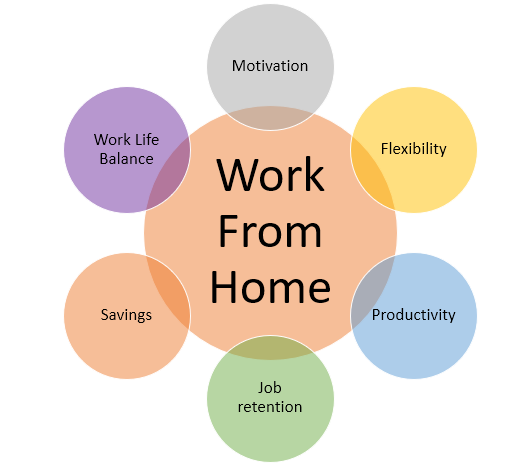The COVID-19 outbreak has resulted in a significant loss of human life throughout the world. In addition, it had caused dozens of new problems ranging from human health to food systems to the workplace. Despite this, several firms let their employees work from home (WFH) owing to the epidemic.
Working from home is a concept where an employee may do the official task from the comfort of their own house. It allows people to work flexible hours while also making the job of the company easier. Likewise, the notion of work from home is becoming increasingly popular in recent years. Some employees are pleased with the same option, while others are not. And it is understandable.
You may wonder why. There is no question that it is beneficial to the employee’s work-life balance. However, there are a few advantages and disadvantages to this choice that people, or perhaps the entire organization, see.

As a result, let’s take a closer look at the potential benefits and drawbacks of working from home for both workers and businesses. But first, let us define why work from home is so vital in these times.
Why Is WFH Essential Right Now?
Working from home is extremely important in today’s day and age. It’s commonly referred to as a modern work style made feasible by the internet. It also helps people retain the maximum potential level of productivity. It is, without a question, an excellent tool for someone who works from home and wants to stay at home.
Because of what is going on in the world right now, the culture of working from home has risen to new heights. Since 2020, the Coronavirus (COVID-19) Pandemic has kept us all confined to our homes.
And it led to a slew of problems, whether they were health-related or work-related. However, serving from home has allowed many firms and personnel to maintain focus even while under stress.
Benefits of Work from Home Culture
Commuting and presenting oneself professionally, two of the most traditional aspects of arriving to work, are absent. Yet, working from home can give individuals independence that might otherwise be lacking in a conventional office.
Additionally, employees have a better work-life balance. Many people prefer the calmer, friendlier environment that they find at home. It also allows them to focus on their work and finish the given task on time. Furthermore, there are significant cost reductions in terms of office and personal expenses.
Work from home, to be honest, sounds quite relaxing. Being extremely productive and having the freedom to roam around and take breaks whenever you need to. In addition, workers are no longer distracted by workplace noises such as coworkers conversing, equipment operating, or phones ringing. And the benefits don’t only apply to employees; they also apply to the entire organization.

The firm will have to spend less money on workplace upkeep. Furthermore, if human resources are in desperate demand, they can employ the best workers from any place. On the other hand, employees may not request many leaves, which becomes a merit subject for both sides.
However, as much as people applaud the culture, there are still a few downsides that individuals and organizations must deal with.
Drawbacks of Work from Home Culture
The first is that the boundary between work and home will be murky and unclear regarding the negatives. Employees who feel they should leave their job stresses at work and come home to unwind will be missing. This may create anxiety, resulting in an unhealthy and imbalanced work and personal life.
Furthermore, while at home, teamwork will become harder to execute. Also, it has the potential to impair social and interpersonal abilities and make some people feel lonely. This leads to WFH saturation.
To add to the list, WFH might help you boost your productivity, but it can also cause struggle. The freedom to move about and take breaks anytime you want is how the whim strikes, making it more difficult to stay focused.
The freedom to move about and take breaks anytime you want is how the whim strikes, making it more difficult to stay focused.
It’s also tough for businesses to keep track of workers who operate from home. Similarly, it is hard for firms to form bonds among their personnel.

There are pluses and minuses to working from home. However, most firms still give this to their employees, and it has been the standard in recent times. On the other hand, some think splitting the week into working from home some days and going to the office on others is a great benefit. As a result, it is up to the employers to choose whatever method they want to use.
Also Read: Working From Home? Try These Four Productivity Tools









